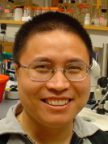Primary Faculty
Primary faculty
Assistant Professor of Cell and Developmental Biology
The Burkewitz lab is interested in understanding what causes the elderly to be at such great risk for these diseases when the young are not. What are the common biological changes that underlie many of these diverse forms of age-dependent pathogenesis, and are there ways to intervene and prevent these changes from occurring?
Lab Website
: Lab: 4160 Medical Research Building III
delivery address: 465 21st Avenue South
Room 4160 MRB III
Nashville, Tennessee - 37232- : kristopher.burkewitz@Vanderbilt.Edu
- : 615-343-6528
- : https://lab.vanderbilt.edu/burkewitz-lab/
Associate Professor of Cell and Developmental Biology
Using multidisciplinary scientific methodologies, the Burnette lab aspires to understand the growth of the human heart on a single cell level.
Lab Website
: 526 Engineering and Science Building
2414 Highland Ave
Nashville, - 37212: 505 Engineering and Science Building
2414 Highland Ave
Nashville, - 37212- : dylan.burnette@vanderbilt.edu
- : 615-343-1024
- : 615-434-1024
Professor of Cell and Developmental Biology
Our laboratory is interested in how defined numbers of functionally and neurochemically different neurons are established and later incorporated into a functional cerebellar circuit, and how defined perturbations of this circuitry affects the ability of animals to integrate and process sensory information.
Lab Website
: 4110 Medical Research Building III
: 4114 Medical Research Building III
- : chin.chiang@vanderbilt.edu
- : (615) 343-4922
Assistant Professor of Cell and Developmental Biology
The Dani lab studies the choroid plexus, a vital brain barrier that produces cerebrospinal fluid and generates factors that support brain health throughout life. We seek to uncover mechanisms driving the normal development and maturation of this barrier, its breakdown in neurological disease and ways to leverage these insights to develop new therapies.
Lab Website
: Office: 3150A Medical Research Building III
465 21st Avenue South
Nashville, Tennessee - 37232: Lab: 3154 Medical Research Building III
465 21st Avenue South
Nashville, Tennessee - 37232- : neil.dani@vanderbilt.edu
- : (615) 322-5222
Assistant Professor of Cell and Developmental Biology
Assistant Professor of Surgery
The DelGiorno lab is studying the physiological role of metaplasia-derived secretory cell populations in injury, pre-invasive disease and tumorigenesis with the ultimate goal of exploiting anti-tumorigenic signaling or target pro-tumorigenic signaling pathways for patient benefit.
Lab Website
View Kathy DelGiorno’s Basic Sciences faculty profile video.
: 3140A Medical Research Building III
: 3140 Medical Research Building III
465 21st Avenue South
Nashville, Tennessee - 37232- : kathleen.delgiorno@Vanderbilt.Edu
- : 615-343-8769
Associate Professor of Cell and Developmental Biology
Associate Dean for Equity and Inclusive Mentorship
Our lab is interested in uncovering new pathways regulating these stem cell properties. We are particularly interested in characterizing the functions of apoptotic proteins in maintaining self-renewal and pluripotency and in the regulation of differentiation and reprogramming.
View Vivian Gama’s Basic Sciences faculty profile video.
: 4150A Medical Research Building III
- : vivian.gama@vanderbilt.edu
- : 615-875-9490
Louise B. McGavock Professor, Department of Cell & Developmental Biology
AAAS Fellow - 2011
Cell Division Signaling
: B2309 Medical Center North
- : kathy.gould@vanderbilt.edu
- : (615) 343-9502
Professor of Cell and Developmental Biology
My laboratory studies the molecular and cellular mechanisms underlying beta cell production, function, and maintenance in the vertebrate pancreas. De-regulation of the above processes result in diabetes, which afflict over 5% of the world populations.
Lab Website
: 9415D Medical Research Building IV
: 9415D Medical Research Building IV
- : guoqiang.gu@vanderbilt.edu
- : (615) 936-3634
Associate Professor of Cell and Developmental Biology
Associate Professor of Neurological Surgery
My laboratory uses cytometric approaches to 1) identify proliferative pathways that are differentially active within cell subsets in the stem cell niche of the ventricular-subventricular zone), 2) determine how this pattern of activation is altered in disease states, particularly pediatric neurological disorders and adult high-grade brain tumors, and 3) directly identify subpopulations of progenitor-like brain tumor cells using multiparameter single-cell protein analyses.
View Rebecca Ihrie’s Basic Sciences faculty profile video.
: B2317 Medical Center North
1161 21st Avenue South
Nashville, Tennessee - 37232- : rebecca.ihrie@vanderbilt.edu
- : 615-936-2951
Associate Professor of Cell and Developmental Biology
Associate Professor of Pathology, Microbiology and Immunology
A defining feature of research in the Irish lab is the use of primary human tissue to reveal new cell types and dissect cell signaling mechanisms in healthy development and disease. Our group creates innovative technologies that measure the essential functions of millions of individual cells from patient biopsies.
View Jonathan Irish’s Basic Sciences faculty profile video.
: 740/742 Preston Research Building
2200 Pierce Avenue
Nashville, - 37232- : jonathan.irish@vanderbilt.edu
- : 615-936-3460
Professor of Cell and Developmental Biology
In our lab, we aim to understand molecular and spatial differences between MT networks in specific cells types, and how these differences promote physiological functions of these cells.
Lab Website
: 552 Engineering and Science Building
2414 Highland Ave: 506B Engineering and Science Building
2414 Highland Ave- : irina.kaverina@vanderbilt.edu
- : (615) 936-5567
Professor of Cell and Developmental Biology
Professor of Surgery
Our lab develops and applies computational approaches to high content data generated by single-cell technologies to understand epithelial tissue function and organization. The intestinal epithelium is a single cell layer that separates the trillions of microbes in the gut lumen from the host’s body. The central goal of my lab is to understand how the inflammatory microenvironment, the so-called “niche”, signal to epithelial cells to alter their phenotypes.
Lab Website
View Ken Lau’s Basic Sciences faculty profile.
: 10475 Medical Research Building IV
2215 Garland Avenue- : ken.s.lau@vanderbilt.edu
- : (615) 936-6859
Professor of Cell and Developmental Biology
Professor of Pharmacology
My laboratory is interested in understanding the basic mechanism by which a Wnt signal is propagated and how this information can be used in regenerative medicine and in the treatment of cancer.
Lab Website
: U4225 Medical Research Building III (Learned Lab)
- : ethan.lee@vanderbilt.edu
- : (615) 322-1307
Chair of the Department of Cell & Developmental Biology
Professor of Cell & Developmental Biology
Louise B McGavock Chair
AAAS Fellow - 2018
ASCB Fellow - 2019
Our lab is deeply interested in how epithelial cells make collective decisions and maintain homeostasis; and how these processes are disrupted in response to damage, and during cancer initiation. We use mouse mammary gland and skin, plus human breast organoids, as model epithelial systems. We develop novel transgenic mouse models, genome-wide CRISPR screens, and quantitative, single-molecule imaging modalities to address fundamental questions about epithelial function.
: U3209 Medical Research Building III (Learned Lab)
: U3200 Medical Research Building III (Learned Lab)
- : ian.g.macara@vanderbilt.edu
- : (615) 875-5565
- : (615) 343-4143
Associate Professor of Cell and Developmental Biology
The main research objective of my lab is to understand the molecular mechanisms that regulate the composition of proteins at the plasma membrane and to engineer new technologies for artificial remodeling of the cell surface.
: 4130B Medical Research Building III
- : jason.a.macgurn@vanderbilt.edu
- : (615) 343-4259
Professor of Cell and Developmental Biology
AAAS Fellow - 2013
Molecular genetics of neural specificity in Caenorhabditis elegans.
Lab Website
: 3120 Medical Research Building III
: 3120A Medical Research Building III
- : david.miller@vanderbilt.edu
- : (615) 343-3447
Stevenson Chair
Director of Graduate Studies (DGS)
Professor of Cell & Developmental Biology
AAAS Fellow - 2018
Matrix metalloproteinases (MMPs), tissue remodeling, wound healing, developmental biology, Drosophila, genetics, receptor, and signaling, immunity.
Lab Website
: 530 Engineering and Science Building
2414 Highland Ave
Nashville, - 37232-8240: 507 Engineering and Science Building
2414 Highland Ave- : andrea.page-mccaw@vanderbilt.edu
- : (615) 875-5841
Senior Associate Dean for Research in School of Engineering, Cornelius Vanderbilt Chair
Professor of Cell and Developmental Biology
Professor of Biomedical Engineering
Founding Director of the Center for Mechanobiology
The central mission of the Reinhart-King lab is to understand the mechanisms that drive tissue formation and tissue disruption during diseases such as atherosclerosis and cancer.
: 440 ESB
- : cynthia.reinhart-king@vanderbilt.edu
- : 615-875-8309
Associate Professor of Cell and Developmental Biology
Associate Professor of Biochemistry
Associate Professor of Chemistry
Associate Professor of Pathology, Microbiology and Immunology
Member of the Mass Spectrometry Research Center
Our research group develops advanced imaging mass spectrometry and integrated multimodal molecular imaging technologies capable of providing a systems biology view of the tissue microenvironment that spans a wide range of molecular classes (e.g. metabolites, lipids, proteins, genes) and spatial scales (e.g. single cells, functional tissue units, whole organs). We are applying these advanced technologies to better understand critical biomedical research areas such as infectious disease and diabetes.
: V9283 Medical Research Building III
- : jeff.spraggins@vanderbilt.edu
- : 615-343-7333
- : https://lab.vanderbilt.edu/spraggins-lab/
Professor of Cell and Developmental Biology
Ingram Professor of Cancer Research
Professor of Biochemistry
Co-Leader, Genome Maintenance Research Program/VICC
AAAS Fellow - 2012
Regulation of transcription in normal and cancer cells.
: 4140 Medical Research Building III
- : william.p.tansey@vanderbilt.edu
- : (615) 322-1993
Cornelius Vanderbilt Chair
Professor of Cell and Developmental Biology
Scientific Director, Cell Imaging Shared Resource
ASCB Fellow - 2022
Cytoskeletal control of cell morphology
: 528 Engineering and Science Building
2414 Highland Ave
Nashville, TN, - 37232- : matthew.tyska@vanderbilt.edu
- : (615) 936-5461
Cornelius Vanderbilt Chair
Professor of Cell and Developmental Biology
Professor of Pathology Microbiology and Immunology
Director of Vanderbilt Program for Extracellular Vesicle Research
AAAS Fellow - 2016
ASCB Fellow - 2022
How the secretion of small extracellular vesicles from cells promotes aggressive, invasive behavior and facilitates tumor growth and metastasis.
: 748 Preston Research Building
2220 Pierce Avenue
Nashville, Tennessee - 37232-6840- : alissa.weaver@Vanderbilt.Edu
- : 615-936-3529
- : More Information/Publications
- : https://my.vanderbilt.edu/alissaweaver/
Louise B. McGavock Chair
Professor of Cell and Developmental Biology
Director, Vanderbilt University Program in Developmental Biology
Associate Director, Vanderbilt Center for Stem Cell Biology
AAAS Fellow - 2012
Molecular embryology /vertebrate embryogenesis /transcription factors/intercellular signaling.
Lab Website
: 9415 Medical Research Building IV
- : chris.wright@vanderbilt.edu
- : (615) 343-8256
- : (615) 343-8258
Professor of Cell and Developmental Biology
Professor of Chemical and Biomolecular Engineering
Professor of Biochemistry
Molecular cell biology, physical biology, biophysics, cytoskeleton, microtubules, microtubule dynamics.
View Marija Zanic’s Basic Sciences faculty profile video.
: 550 Engineering and Science Building
2414 Highland Ave
Nashville, - 37212- : marija.zanic@vanderbilt.edu
- : 615-343-8501
- : 615-343-8537
Assistant Professor of Cell and Developmental Biology
Training Faculty, Vanderbilt Brain Institute
Molecular mechanisms of vesicle-mediated cell-to-cell communications in the central nervous system.
: 7158 Medical Research Building III
465 21st Avenue South
Nashville, Tennessee - 37240- : qiangjun.zhou@Vanderbilt.Edu
























